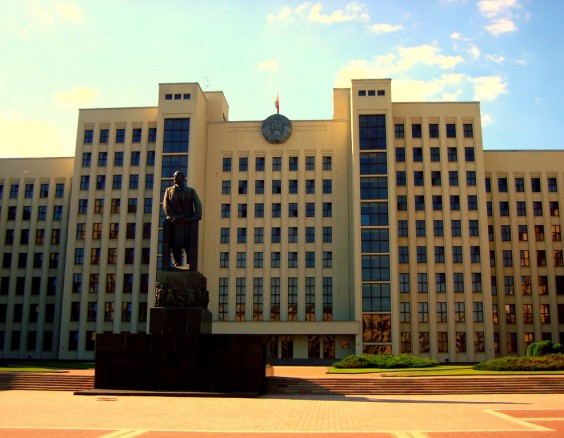Q&A: What It’s Like to be a Journalist in Belarus
by IFEX text by Caro Rolando / May 21, 2015 / No comments

House of Government, Minsk, Belarus. Photo by Flickr user: Ferry Vermeer.
Q&A with Andrei Bastunets, chairperson of the Belarusian Association of Journalists
It’s no secret that, in the ever-competitive world of journalism, freelancers around the world tend to have it the hardest. Many lack steady pay-cheques, others have difficulty accessing sources without the backing of major media outlets, and many have no legal protection from employers if faced with libel or defamation suits.
But to freelancers in Belarus, said setbacks may seem minimal in comparison to the Mass Media Law that essentially forbids them from practicing journalism. A set of broad and vaguely worded amendments to this law were endorsed by President Aleksandr Lukashenko on 20 December 2014. Effective 1 January 2015, these amendments extend restrictions on the traditional press to the online media, making it easier for the government to shut down websites, and almost impossible for journalists to do their work in Belarus.
In April 2015, I spoke with Andrei Bastunets, the chairperson of the Belarusian Association of Journalists (BAJ)—an IFEX member organisation—about how these recent developments are affecting journalism and access information in Belarus.
Bastunets, who was elected as the head of BAJ last month, is a writer and a graduate of the Belarusian State University’s Faculty of Law. From 1998-2000, he was deputy chair of Femida Nova, until the newspaper stopped publishing. In 1998, Bastunets also began working for BAJ. In addition to his current role as chairperson of the association, Bastunets is a jurist who heads the Centre for Legal Support for Journalists of BAJ – a centre that provides civil litigation services to BAJ members. Bastunets also writes poems and music.
How would you summarize Belarus’ current free expression landscape?
The freedom of speech situation keeps getting worse. After establishing control over traditional media—and practically total control over TV broadcasting—the authorities are trying to expand their grip on web and book publishing at the legislative level.
In terms of law enforcement, the environment for journalists has deteriorated, too. Freelance journalists face administrative liabilities for cooperating with foreign mass media without accreditation. In 2015, 12 journalists have been fined and two are pending trial. Since 2014, when these kinds of fines were imposed for the first time, it makes a total of 22 fines amounting to almost 100 million rubles, which is equivalent to almost $7,000 USD. At the end of 2014, more than 10 informational resources were blocked for some time without legal grounds for doing so.
In December 2014, President Alexander Lukashenko approved the law “On introducing amendments to the Law on Mass Media of the Republic of Belarus.” What concerns does this law bring up for journalists in Belarus?
The amendments to the Mass Media Law toughly regulate the order of distributing information on the Internet. The definitions of the law are vague and leave room for its arbitrary application.
The biggest threat to journalists is the possibility for the authorities to block online media without judicial decisions, upon decision of the Ministry of Information. Without the definition of which exact websites are lawful, the authorities could use its norms in fact against any Internet resources, regardless of the fact whether they are considered to be mass media in the countries of their location. Not only websites from Belarus can be blocked; websites from anywhere can also be blocked, for even a single violation of the law.
Why do you think the government adopted such a harsh law?
The deteriorating economic situation here could strengthen public dissatisfaction with the authorities, and there are presidential elections this year. Elections are usually accompanied by increasing control over mass media.
What kind of reporting is the government trying to suppress?
Traditionally, the government obstructs the dissemination of information about corruption amongst the authorities, relations between the ruling elites, and also coverage of the situation in the country during the economic crisis.
How has web censorship affected access to information in Belarus?
Whereas previously, the government resorted to unlawful restricting access to websites from time to time—without admitting to the blocking—now it has the legal possibility to block “objectionable” websites without judicial sanctions. Starting in 2016, in compliance with the Presidential Decree No. 6 “On urgent measures to combat illegal drugs trafficking”, Internet providers will be obliged to collect and store information about what websites Internet users visit, creating the possibility for total control over web users.
What can the international community do to support free speech in Belarus?
It is important that problems of freedom of speech in Belarus do not fall out of sight of international journalistic and human rights organizations. Appeals by international organizations to state bodies—though they do not have evident effect—serve as a constant reminder that international human rights standards are violated. They demonstrate that the international community pays attention to these violations, and this often prevents similar violations in future. For journalists subject to pressure from the authorities, the solidarity and support of colleagues and of journalism organizations are very important.




